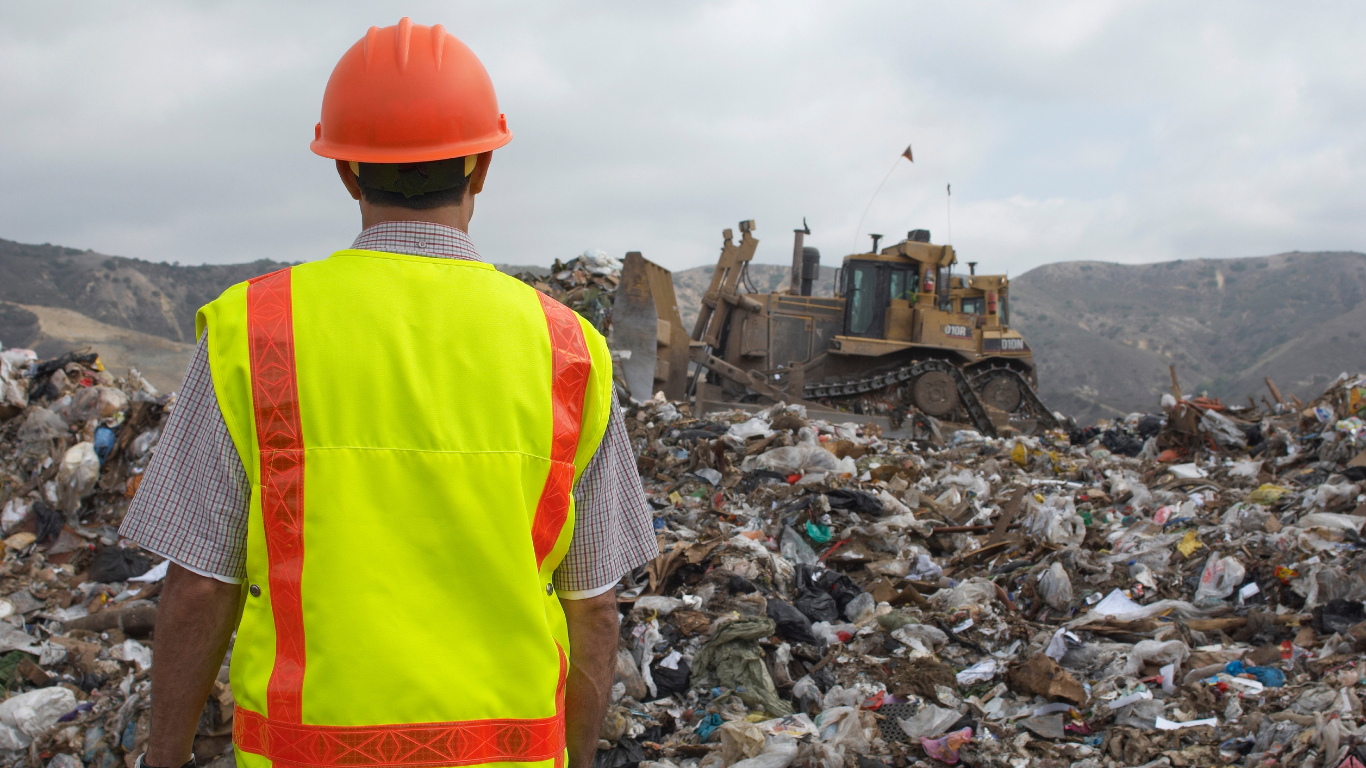
When waste is handled incorrectly, it can pollute groundwater and rivers, attract pests, and create serious public health concerns. Our job is to prevent that from happening.
We work with facility operators and the public to ensure that solid waste is managed safely and responsibly. We regulate landfills, recycling centers, composting facilities, and other waste operations to protect Marylanders and the environment—especially our precious water resources. Check out our
permit application page to download applications. All facilities are required to file
tonnage reports annually.
Maryland generated about 12.5 million tons of solid waste in 2023, a 16% decrease from the previous year. This total includes waste managed by permitted facilities, non-permitted sites, recycling programs, and materials sent out of state.
Our landfills reported having just over 69 million tons of remaining capacity. With nearly 2 million tons disposed of in 2022, the state has an estimated 34 years of landfill space left at the current rate. However, that estimate could change depending on population growth, waste trends, or if older landfills close or new ones open.
Who We Regulate and Why It Matters
Maryland has had waste laws in place since 1914 to keep communities safe. We work with:
- Landfills (municipal, rubble, and industrial)
- Recycling and transfer stations
-
Composting operations
- Natural wood waste facilities
- Medical waste facilities
- Incinerators
- Hazardous waste handlers
- Coal management units
We make sure these facilities operate cleanly, monitor pollutants, and follow strict rules to prevent contamination and nuisance conditions.
What Facility Operators Need to Know
Permits are required if you’re building or operating a waste-related facility. You may need one or more of the following:
- Refuse Disposal – for landfills and other solid waste acceptance sites
- Natural Wood Waste Recycling – for facilities that process tree debris into mulch, compost, or firewood
- Composting Registration or Permit – for larger-scale composting operations
- Hazardous Waste Management Authorization – for storing, transporting, or disposing of hazardous waste
Full list of
permitted facilities.
Refuse Disposal Facilities
We regulate refuse disposal facilities to ensure the proper disposal of solid waste in an environmentally acceptable manner while protecting public health and the environment, including surface and groundwater. A
Refuse Disposal Permit is required for the installation, alteration, or extension of a facility. The permit regulates the design, construction, operation, and monitoring of such facilities to minimize the impact on public health and the environment.
Natural Wood Waste & Composting
Recycling yard waste and organic material is good for the environment—but only if done responsibly. If you run a business that takes in natural wood waste—like tree trunks, branches, stumps, or wood chips—and you plan to sell or distribute that material, you need a permit from the state. However, you don’t need a permit if you're a nonprofit, a government-run site, or a private business that only recycles wood from your own property and for your own use.
You also don’t need a permit if you grind up wood on the same property where it was cut down and keep the mulch there without selling or giving it away. While there’s no fee to apply for the permit, you may still need to meet certain environmental requirements, which could involve some additional costs.
Hazardous Waste & Open Burning
Hazardous waste is regulated by teams that handle rulemaking, permitting, tracking, inspections, and transporter certification. This waste can come from manufacturing or discarded chemicals, and managing it safely requires detailed permits and reports. Maryland works closely with federal agencies to stay aligned with national standards, especially for items like wipes, aerosol cans, and recalled airbags. For questions, call 410-537-3314.
Open burn permits from local health departments help manage air quality, but they don’t override state laws on solid waste.
Burning materials like trash, construction debris, or tires can release harmful pollutants and may still be illegal, even with a permit. Only in limited cases—such as recreational fires, rural home burning, or disaster recovery—might burning be allowed.
Permit requests must be carefully reviewed to protect public health and the environment. Burning for convenience is not a valid reason. Maryland encourages safer options like recycling or disposal at approved sites, and offers support to local governments handling burn permit decisions. For questions, call 410-537-3315.
Sewage Sludge
We also regulate sewage sludge, sometimes called biosolids, which is not raw sewage. It is what’s left after sewage is treated at a wastewater plant. Treatment breaks down organic material and removes harmful organisms, leaving a fine, nutrient-rich material. When applied to land, this material adds nutrients and organic matter to the soil, helping it retain water and making it easier to farm. In Maryland, anyone who handles, stores, treats, applies, transports, or disposes of this material needs a special permit.
For more information, call 410-537-3314.
PFAS Monitoring Requirements
All permitted facilities conducting groundwater monitoring must test for six types of PFAS chemicals (also called “forever chemicals”) including PFOA, PFOS, and GenX. These compounds can be harmful even at low levels.
Read our PFAS letter to operators
Required PFAS testing parameters